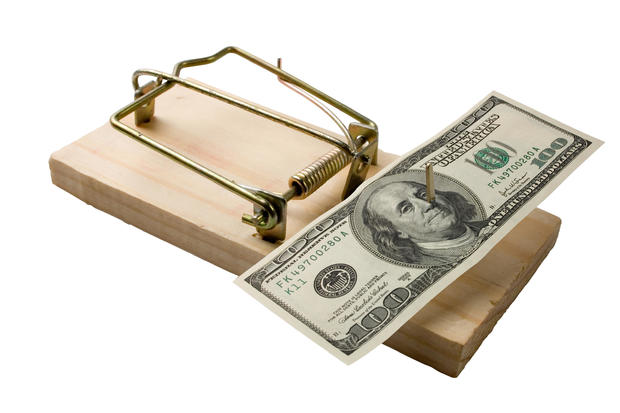5 big money traps to avoid in 2024, according to experts
In the nearly four years since the pandemic took hold in the US, the economy has taken many unexpected turns. In 2020, for example, the stock market briefly plunged before soaring to new highs. But the economy got too hot too fast, and inflation soared in 2021 and 2022.
Since then, the Federal Reserve's actions have broadly pushed up interest rates, creating dual issues of affordability — not only are prices higher in most areas, but the cost of borrowing, such as for a mortgage, also got more expensive. Fortunately, inflation started cooling in 2023, though it's still higher than the Fed's 2% target. In December 2023, core inflation measured 3.9%.
Now, with the new year underway, many consumers are looking forward to the prospect of lower interest rates and lower inflation. But that doesn't mean managing your money in 2024 will be a walk in the park. There are still significant money traps to avoid.
One easy one to circumvent? Low interest-earning savings accounts. Instead, get started with a high-yield one now and start earning significantly more interest on your money.
5 big money traps to avoid in 2024
Here are five financial moves you should avoid making this year.
Earning low interest on cash
Interest rate increases have incentivized many savers to put money into accounts like certificates of deposit (CDs), high-yield savings accounts and money market accounts. And if you haven't already moved your cash from a low-interest account to a high-interest account, you might want to do so while rates are still high. However, watch out for the trap of keeping too much of your money in cash, especially if interest rates decrease.
"One of the top money traps individuals may face in 2024 is leaning too heavily into cash at the expense of higher potential returns in the markets," says Jill Fopiano, a Certified Financial Planner (CFP) and president and CEO at O'Brien Wealth Partners.
In 2024, with expected rate cuts, those who have not locked in rates could experience declining returns on cash. And even if you did lock in a good rate, you have to consider your objectives. If you know you want a certain amount of security and liquidity, then assets like CDs or high-yield savings accounts could be useful.
"It can be tempting, with higher yields on cash, to avoid investing in a diversified portfolio designed for growth over time. Don't be tempted. Interest rates on cash investments are already falling early in 2024," says Rob Williams, managing director of financial planning at Charles Schwab.
"We suggest that investors maintain the cash you need to provide an emergency fund and fund goals or spending that you may need over the next few years. Then have a plan — that fits your needs, time horizon, and risk tolerance — to stay invested for long-term goals," he adds.
Start exploring your CD account options now and lock in a high rate while they're still available.
Paying too much interest
The interest you earn isn't the only thing to keep an eye on in 2024; you should also avoid the trap of paying too much interest. The pain of accruing interest isn't always as visible as things like the interest you're earning on your savings account, but don't assume that you should stay in cash at the expense of paying down high-interest debt.
"Just as savings rates have increased, floating rate debt — credit cards, car loans, some student loans — has also become more expensive. Take a look at your full debt picture and apply any excess funds to paying down the most costly debt you have. Earning 5% on savings and paying 20%+ on your credit card balance is a negative arbitrage which can quickly drain your cash," says Fopiano.
Even if interest rates decrease in 2024, that still likely means that you're better off paying down high-interest debt rather than keeping your money in lower-returning accounts. However, you may be able to take advantage of lower interest rates in 2024 by renegotiating with lenders or refinancing with a new lender.
"With the Fed signaling that they will possibly lower interest rates in the future, there may be more opportunities to ask creditors for a lower interest rate or for balance transfers at promotional rates," says Kayla Walter, CFP, senior financial planner, Bailey Wealth Advisors.
Relying too much on speculative assets
It's easy to get caught up in the hype of speculative assets, especially when the past few years have been full of occurrences like meme stocks soaring and NFTs taking off. But what goes up quickly can also come down quickly — or it might fall before you even have a chance to experience on-paper gains. So, it's important to not take on more risk than you're comfortable with.
For example, Tom Siomades, Chartered Financial Analyst (CFA), chief investment officer at AE Wealth Management, says that one of the top money traps for 2024 is crypto ETFs because "there will be a lot of hype surrounding them, and hype and investments seldom mix well."
The SEC also recently approved the first bitcoin ETFs. While Siomades says he would avoid this area of crypto, if you do decide to partake, "make sure you are buying one from a solid company and read the fine print."
You also want to make sure that you're not putting all your eggs in one basket or taking on more risk than what's arguably warranted for your situation. For example, you probably don't want to be gambling with your emergency fund or retirement portfolio.
"No doubt, there have been friends, family, or investors we see on television describing how they built large sums of wealth through buying a particular investment: a single stock, their own company, gold. Some of us may have had some success doing this ourselves. But, on average, for long-term investing, investing successfully is not a choice of this single investment, or this other investment. It's a choice of how much of each," says Williams.
In other words, a diversified portfolio is often the way to go for building long-term wealth.
Not having enough life insurance
Another money trap to avoid in 2024 is not having enough life insurance. While you don't want to fall into the trap of paying too much for life insurance by buying more than you need, you also don't want to assume that you're protected, such as through your employer's coverage.
"For many people, the life insurance coverage that they have through their job covers two times their salary at best, and it's not portable. Meaning that when you leave the employer, that coverage stays with them. It is best to have your own policy outside of your job so that you are always covered," says Walter.
Start exploring your life insurance options by getting a free price estimate here.
Not saving enough for retirement
Lastly, watch out for the money trap of not saving enough for retirement. Many experts suggest investing 10-15% of your annual salary for retirement as a rule of thumb, depending on factors like your age and current retirement balance. If you haven't been saving and investing, you may need to do more to catch up.
"It may never be easy to balance all the goals that can be important to each of us, including retirement, especially when we're younger or balancing multiple goals, like most of us, including paying the bills," says Williams.
"This may be particularly true in 2024, given the recent jump in inflation and rising cost of everything from childcare to a home, concern about the health of the economy, or just how to pay off our holiday credit card bills," he adds. "But balancing these things, including finding a way to save for retirement, builds confidence and financial health and wealth."
Set yourself up for success
2024 will likely bring changes to the economy and your personal finances, such as if interest rates decrease, though it could still take a while for affordability to improve. With these circumstances in mind, try to avoid the aforementioned money traps so you can better position yourself, even if conditions remain challenging. Instead, focus on the fundamentals, like diversifying your investments and investing enough for retirement.
"Finances are emotional, and we often avoid or postpone dealing with emotional things. This is normal. But also a trap," says Williams. "But if you truly want to take ownership of your finances, being aware of these emotions, procrastination, and other tendencies, and then having a plan to address them, is the key to financial success for most investors, in our view."




